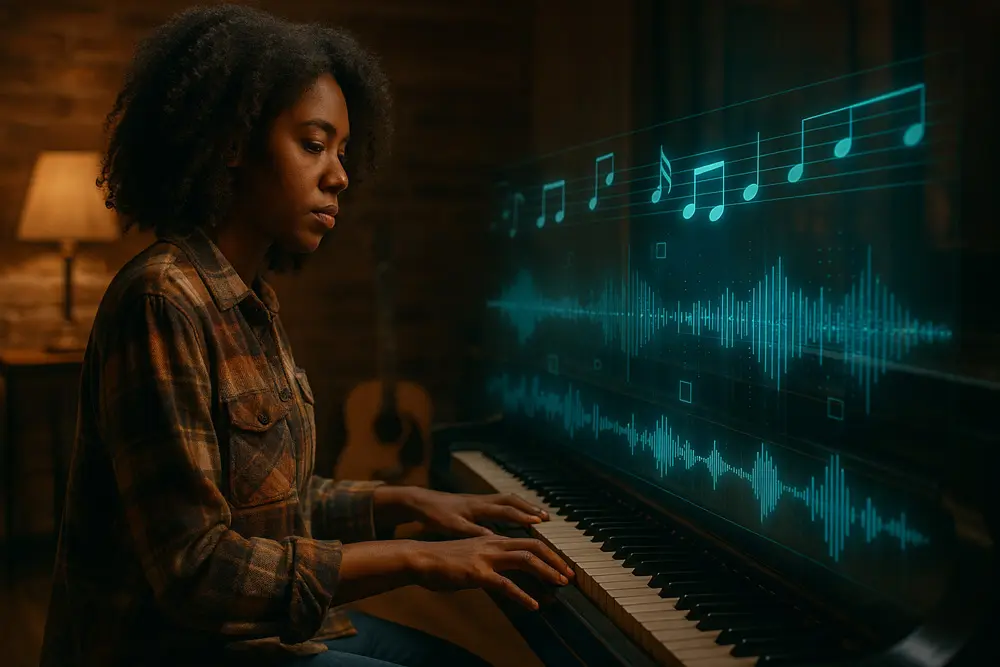There's a rumor making the rounds in Nashville that ASCAP won't register a song if it has more than 50% AI content. It sounds like a neat line in the sand, but it's not true. Here's what PROs really say…
by CountryDemoStudio Staff | August, 21, 2025.

One of the most frustrating aspects of the current AI music landscape is the lack of clear standards for AI-generated songs. With every industry entity you can think of—publishers, music licensing agencies, PROs, record labels, and even the US copyright office—it's very much a gray area.
In this article, we'll attempt to illuminate this subject. However, for the time being, musicians should continue to gather as much information as possible and strive to follow best practices as they are discovered.
No performing rights organization (PRO) has a 50/50 rule. Neither ASCAP nor BMI has published any "percentage" threshold. That number isn't in ASCAP's public policy, BMI's member handbook, or anywhere on SESAC's site. It's likely a piece of songwriter and studio folklore that spread because it sounds reasonable. In reality, the rules are both stricter and more nuanced.
What they have done is issue policies that align with the U.S. Copyright Office's guidance: only human authorship is copyrightable, and therefore, only human authorship is eligible for PRO registration.
BMI: In their public guidance, BMI states that they are not accepting fully AI-generated works or partially AI-generated works for registration, and they are not paying performance royalties on such works at this time.
ASCAP: ASCAP's published stance points back to U.S. copyright law. Since musical works that are entirely generated by AI aren't copyrightable, ASCAP won't register them either. For hybrid works, they stress that the human-authored portions are what can be protected and registered.
SESAC: SESAC hasn't published a detailed registration policy, but they've signaled support for legislation that protects human creators in the age of AI.
The U.S. Copyright Office requires creators to disclose AI-generated material when registering a work. They will only grant protection to the human contributions. In practice, this means if AI drafted your lyrics or melody, you must state that — and only claim authorship on the parts you wrote yourself.
Here's how to keep yourself (and your songs) safe:
Keep session notes on who contributed what, and which tools were used. If AI was part of the process, write down how you altered or rewrote the material.
↓📁 We've created a free downloadable checklist to help: AI Song Human Contribution Checklist | (PDF 155.33 KB)
When filing with the Copyright Office, note any AI-generated elements. Only the human-written sections are protectable — those are the authorship claims you list with ASCAP, BMI, or SESAC.
⚠️ Be Aware: Accurate AI-detection tools already exist, and their usage is likely to become more widespread. Failing to disclose AI usage and having it detected later could harm both your reputation and livelihood in the future.
Using AI for production — such as vocal tuning, stem separation, or voice modeling — doesn't alter the composition. The PROs are focused on songwriting, not mixing tricks.
Forget "Is my song 49% or 51% human?" The real question is: what did the humans write? That's what gets registered.
The bottom line: PROs don't care about "50%." They care about human authorship. If the heart of your song — the melody and lyrics — came from you, you're on solid ground. If AI wrote significant chunks, you need to treat those sections as unprotectable unless you rewrite them into something new.
📌 Pro Tip: In your PRO work registration, list only the human authors, and use the "notes" field if you want to explain that AI was used in production but not in authorship.
AI tools are transforming the way we write and produce music, but when it comes to publishing and performance royalties, human creativity remains the key differentiator.
👉 If you've written a song with AI help and want to make sure it's polished, protectable, and ready for the industry, our AI-to-Human Song Service can help. We take your AI-assisted ideas and transform them into professional, fully human-performed demos that you can confidently register, pitch, and protect.
Find the song demo style that fits your budget and your goals.
See Services